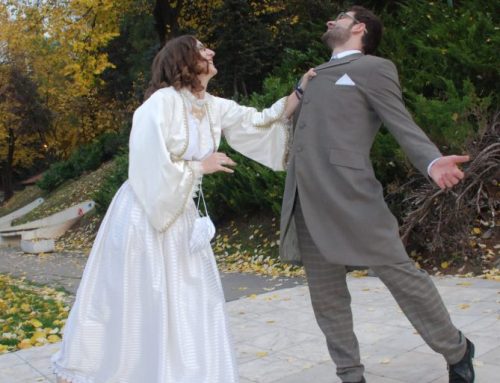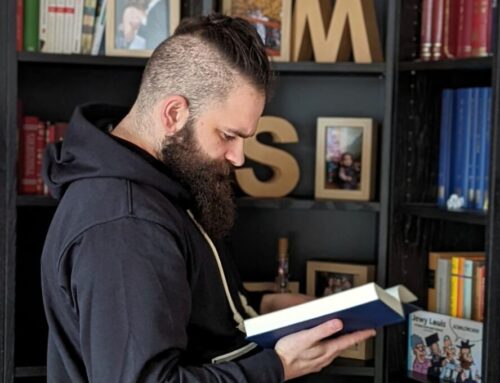It’s been over a month since I returned from an entirely unplanned trip to Serbia. Alongside all the deeply emotional events that still need time to settle before I can write about them, the main “aftertaste” lingering since day one of my return is the sheer amount of nonsense—dare I say absurdities—that people down there feel compelled to say.
This isn’t the first time I’ve been shocked by others’ comments or questions, and I’ve written about it before, particularly about remarks directed at Sofia or concerning her.
I understand that we’ve been living abroad for a long time and that we’ve not only forgotten or suppressed many things from our past environment but also adopted aspects of the culture here (because, let’s be honest, it’s easy to get used to good things). But everything has its limits, even human—or shall I say, cultural—ignorance.
People have a need to comment on everything and meddle more in other people’s lives than their own, and that’s just how it is down there. I’m not discovering America here, I know. Complaining is also a national pastime, yet no one seems willing to take responsibility for their one and only life or their own actions. That’s just the way we are as a people. I’m aware of all this.
What specifically bothers me, though, is the commentary and astonishment over things that are completely normal and reasonable life choices for us.
But let’s start from the beginning.
This was the first time I traveled alone, without Marko or Sofia—not by choice, but because we were forced into it by German bureaucracy (yes, we still haven’t resolved our status here; shocking, I know).
The reason for this sudden trip wasn’t pleasant, so I secretly hoped to avoid all the usual clichés people direct at someone who hasn’t lived in Serbia for ages.
I hoped—but was, yet again, proved wrong by reality.
This time, the most frequent question after “Why did you come alone without your husband and child?” was: “So, who’s watching your child?”
I understood this as an implicit judgment: What kind of mother leaves her young child to who-knows-whose mercy just to go gallivanting around on her own?
Wait a minute—if I came without Marko and without Sofia, doesn’t it stand to reason that Marko, who is her father after all, is taking care of not my child but our child?
Yes, this is normal to me—but not to others.
The inevitable follow-up question to my answer, “Marko is taking care of her, who else?” was: “But does he know how? And who’s helping him?”
I can’t describe the repeated shock I felt, because, as I’ve mentioned, this wasn’t a one-time occurrence.
And no, no one asked me if it was hard for me to be without them, how I was coping with being separated from Sofia for the first time for more than a day, or how difficult it must be for the two of them not to be here during this time.
Maybe the problem is me.
Maybe it’s unrealistic and unfair for me to expect that my life choices and the life Marko and I have built together—tailored to our needs and circumstances—should be representative or acceptable to others. No, I don’t want to impose anything on anyone. Everyone has the right to choose their partner, how they raise their children, and how they organize their lives.
Clearly, our life doesn’t fit the majority’s mold—and frankly, I’m very proud of that.
Marko is someone who, from the very start of our relationship, and later our marriage, has made every effort—for me, for our shared home, and for Sofia. He’s dedicated and selfless when it comes to his family. He’s the head chef in our home, and I’m never embarrassed to admit it—far from it, I’m proud of it. In our home, there’s never been such a thing as “men’s work” and “women’s work”; we’ve always done everything together. Literally everything.
So, if Marko can wash dishes, cook, and clean the house, why on earth wouldn’t he be capable of taking care of his own child?
Of course, this brings us to the deeper assumption about what a man is allowed, able, and supposed to do in his home and for his family.
And here, again, we don’t fit the mold. Imagine this: in addition to fixing things around the house, he also enjoys and takes pride in maintaining it—not by putting his feet up and complaining about what’s dirty, but by addressing it himself or working with me to handle it. Unbelievable, right? Or maybe not.
For us, this is entirely normal. But just how abnormal it is for others becomes glaringly apparent when guests from the Balkans visit us and are shocked at how we function and what Marko does around the house. I can’t count the times I’ve heard, “Wow, you’re so lucky to have a husband like him.”
Yes, I know I’m lucky, and I thank God every day for having him just the way he is. But I won’t pretend to be modest here. My husband never misses the chance to respond to such remarks with, “Well, considering I have a perfect wife, I have to be a perfect husband.” It’s not about actual perfection. We both feel the need to respond to such comments with exaggeration. Neither of us is perfect, nor are we striving to be.
This is just how things work for us—we’re not subordinate to each other; we’re partners, equals. And when we make mistakes, we make them together.
Don’t forget that we live here without the large extended family that could step in whenever we need help. Sure, my Ana is a tremendous support and help, but she’s a student here, with her own life and problems. It’s unrealistic to expect her to drop everything whenever we feel like it. We try to minimize how much we rely on her because Sofia is, first and foremost, our child. We wanted her, and we take care of her. Simple as that.
So yes, it wasn’t easy for Marko to handle a week alone with Sofia, Beni, and all his other responsibilities. But he managed it like a champ, without a single complaint. Just as I’ve done many times when he’s had to travel for work. And guess what? Back then, no one asked how I would manage on my own, whether I’d know how, or if I had help.
That’s what bothers me about all this: the double standards. The conformity to molds. The clucking and eye-rolling at anything even slightly different. The outdated prejudices that are alive and well. That’s what hurts me because, my dear people, despite having the internet, smartphones, and other wonders of the 21st century, many of you haven’t mentally or behaviorally progressed beyond the Middle Ages.
Sincerely,
S-Mama






Leave A Comment